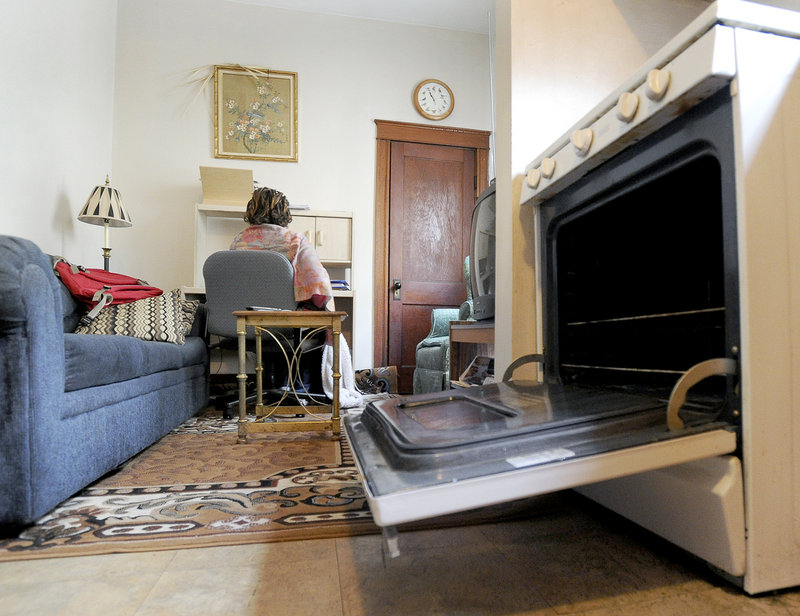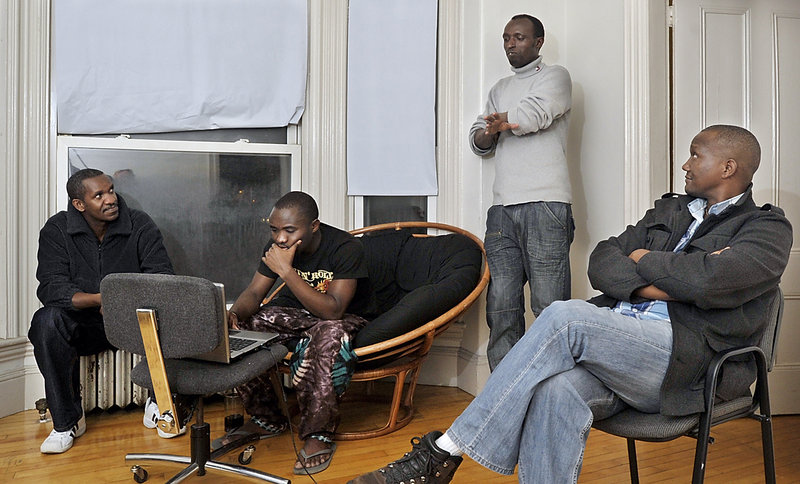Isaac Ishimwe, 23, glanced out his window last week and saw something he had never seen before — white stuff falling from the sky.
He ran outside and let the flakes tumble into his hand. He had expected it to feel more like hail, which falls on rare occasions during thunderstorms in his native Rwanda.
“I thought it would be hard,” he said, recounting his astonishment. “But I touched it, and it melted.”
Besides learning a new language and culture, immigrants from Africa like Ishimwe face another difficult adjustment here: Maine winters.
But it’s not just the novelty of falling snow and frozen puddles. Furnaces, steam radiators and heating oil bills can be just as bewildering.
On occasion, misunderstandings about heating systems and cultural and language barriers can create conflicts with landlords, city officials say.
To prepare newly arrived immigrants for winter, the Portland’s Social Services division offers monthly “winter workshops,” with lessons on how to dress properly, what to do in cases of frostbite, how heating systems work and the cost of heating fuels. The classes are held at the city’s Refugee Services Program at 190 Lancaster St. The next class is on Dec. 28.
A big issue is heat. City officials want to educate immigrants about heating systems to reduce conflicts between immigrants and landlords, said Regina Phillips, director of the Refugee Services Program.
Many of the area’s new immigrants from Africa need higher temperatures to feel warm, or they must wear more clothing, said Jeff Tardif, who runs the city’s Family Shelter, a facility on Chestnut Street with a capacity of 94 people.
He recently visited a family from Burundi who had just arrived in Maine and were living in a motel room. The family was lying in bed and wearing hats, gloves and jackets.
They had never seen a thermostat before and didn’t know how to operate it.
The room was about 70 degrees, and the outside temperature was in the 40s, he said.
“I thought to myself, ‘It’s not cold yet. Wait until it gets really cold,’” Tardif said.
At the class, immigrants learn about wearing extra clothing rather than turning the thermostat up or using a gas stove for heat, which is dangerous, said Efrem Wel, 74, who works on the city’s Refugee Services staff and has taught the course.
Immigrants also learn to close their windows and doors or they’ll upset their landlords, he said.
Many of the area’s newly arrived immigrants from central Africa are seeking asylum and don’t have the legal right to work while their cases are being processed. They receive rental vouchers for the city-managed general assistance program.
The city inspects all the apartments and handles issues raised by both tenants and landlords.
Maine law requires that landlords who supply heat with the rent maintain a heating system capable of heating an apartment to 68 degrees.
But 68 degrees can feel cold for people who have recently arrived from Africa.
Some say they feel warm only when it’s above 80 degrees, Tardif said.
Several tenants at an 11-unit apartment building on High Street last week, for example, complained that their apartments were too cold, and worried how to handle heating once really cold weather arrived.
Some were already heating their apartments by using gas stoves or portable heaters.
The building’s steam radiators seemed to operate strangely, becoming hot for short periods but remaining cold for much of the day, tenants said.
“I am afraid, (the landlord) doesn’t provide heat all day long,” said one tenant, a recent immigrant from Burundi, who would only give her first name, Fredence.
On a recent day, she was wearing two shirts, a sweater and shawl, although the apartment did not seem particularly chilly.
Richard Flare, the apartment manager, said he likes to rent to African immigrants because they make excellent tenants, although he sometimes has conflicts with them over heat. The language barrier is a problem, he said.
Some tenants use portable heaters, which trigger thermostats that control temperatures for other parts of the building to shut off.
He said some tenants open windows in winter, which frustrates him because the heat is part of the rent.
“You can drive by now, and I bet there would be some windows open,” he said.
Dan Hoffman, who owns about 150 apartment units in Portland and South Portland, said city officials do an excellent job educating immigrants about heating systems.
Over the last two years, he said, conflicts over heat have become much less frequent. Now, he doesn’t see much difference between American-born tenants and immigrants over heat, he said.
Over time, immigrants become accustomed to Maine winters and adapt to the cold, Wel said.
But new immigrants often feel weak and cold, even when it is nearly 70 degrees, in part because they arrive malnourished from their poor diet in Africa, he said.
“Thanks to the American people, they get some good nutrition and accumulate some fat,” he said. “When you come here for the first time, it takes time to adjust.”
Staff Writer Tom Bell can be contacted at 791-6369 or at:
tbell@pressherald.com
Send questions/comments to the editors.




Success. Please wait for the page to reload. If the page does not reload within 5 seconds, please refresh the page.
Enter your email and password to access comments.
Hi, to comment on stories you must . This profile is in addition to your subscription and website login.
Already have a commenting profile? .
Invalid username/password.
Please check your email to confirm and complete your registration.
Only subscribers are eligible to post comments. Please subscribe or login first for digital access. Here’s why.
Use the form below to reset your password. When you've submitted your account email, we will send an email with a reset code.